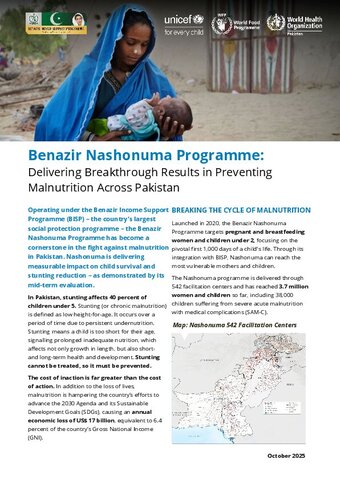
The Benazir Nashonuma Programme for stunting prevention was launched in 2020 and has since supported more than 3.7 million women and children. It is funded and managed by the Government of Pakistan under the Benazir Income Support Programme (BISP) – the country's largest social protection programme – with support from WFP, WHO and UNICEF. The Programme targets pregnant and breastfeeding women and children under 2, focusing on the pivotal first 1,000 days of a child's life.
The Benazir Nashonuma Programme has become the national cornerstone in the fight against malnutrition in Pakistan. Nashonuma's midline evaluation shows some of the strongest results ever documented globally for such a large-scale nutrition programme, with a very high impact on stunting reduction, child survival and reduced zero-dose immunizations. The study found a 6.4 percentage-point lower prevalence of stunting among children under 2 who participated in Nashonuma. Similarly, in intervention districts, the prevalence of low birth weight declined by 5.6 percentage points compared to non-intervention districts. Equally remarkable, the prevalence of stunting at 6 months of age was 20 percent lower among beneficiaries, and the number of small vulnerable newborn births was more than 7 percentage points lower – an unprecedented early gain that is also very important for child survival.
